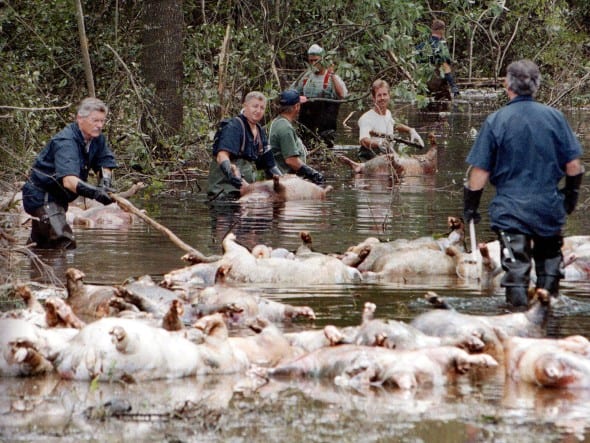Hurricane Florence could cause an environmental and public health disaster, as heavy rains may overwhelm pits holding toxic waste from power plants, industrial sites or animal-manure lagoons. This toxic waste could wash into homes and threaten drinking water supplies.
Heavy rains from Hurricane Florence could overwhelm pits holding toxic waste from power plants, industrial sites or animal-manure lagoons. This toxic waste could wash into homes and threaten drinking water supplies.
North Carolina is a major producer of poultry and hogs, and man-made lagoons that hold manure could be at risk of overflowing into fields and nearby waterways.
In 1999, Hurricane Floyd dumped over 20 inches of rain across eastern North Carolina. The flooding from Floyd caused the mortality of tens of thousands of hogs and pigs and caused waste ponds to overrun, which led to massive water pollution that got into the waterways throughout the state. State taxpayers ended up buying out and closing 43 farms located in floodplains.
To prepare for Florence, the North Carolina Pork Council says its members have pumped down lagoon levels to absorb at least 2 feet of rain. Low-lying farms have been moving their hogs to higher ground.
Florence also threatens to release toxic chemicals from hazardous waste sites that the Environmental Protection Agency (EPA) has designated contaminated superfund sites.
The EPA said it is monitoring about nine of these contaminated sites in the hurricane’s path. The agency is performing vulnerability assessments of nine superfund sites along the coasts of North Carolina and South Carolina, CNN reported.
Following Hurricane Harvey, the EPA reported in September 2017 that 13 toxic waste sites in Texas were flooded and experienced possible damage due to the storm. These damaged toxic sites raise numerous health safety concerns.
Several nuclear power reactors in North and South Carolina and Virginia started were prepped for Hurricane Florence on Tuesday. There are 16 nuclear reactors in North Carolina, South Carolina and Virginia, the states expected to suffer the most damage from Florence.
Duke Energy, which runs reactors at six sites, said operators would begin shutting down nuclear plants at least two hours before hurricane-force winds arrive.
A nuclear plant in Fukushima, Japan, exploded and leaked radiation following a 2011 earthquake and tsunami. Following the disaster, federal regulators required all U.S. nuclear plants to perform upgrades to better withstand earthquakes and flooding, according to Duke Energy.
“They were safe then. They are even safer now,” Duke Energy Spokeswoman Kathryn Green said to Guardian News referring to the post-Fukushima improvements. “We have backups for backups for backups.”
To prepare for the storm, nuclear operators check on backup diesel generators to make sure they have enough fuel, conduct site walk downs and secure any loose equipment that could become a projectile in the wind, Roger Hannah, spokesman for the U.S. Nuclear Regulatory Commission’s (NRC) Region 2 office in Atlanta, said to Reuters on Tuesday.
Disposal sites for coal ash, a byproduct of burning coal to generate electricity, may also cause potential health risks if hit with torrential rainfall. The ash contains potentially harmful amounts of mercury, arsenic and lead, which poses risks to public health and the environment if spilled into drinking water supplies.
Duke owns 31 coal ash basins in North Carolina, containing a total of about 111 million tons of coal ash, according to state estimates as of August 2017.
Duke is moving staff and equipment toward North Carolina’s coast to monitor the coal ash disposal sites. After the storm, staff are prepared to inspect the sites by foot, boat and drone.
Preparations continue to be made as the Category 4 hurricane moves toward the U.S. East Coast, expected to make landfall Thursday night. More than 1.4 million residents across North and South Carolina have been ordered to evacuate.
“Preparations to protect life and property should be rushed to completion,” the National Hurricane Center (NHC) warned Wednesday morning.
(eTN): Hurricane Florence and the danger of toxic waste from power plants | re-post license | post content























